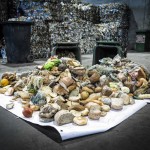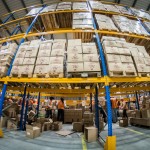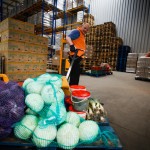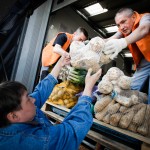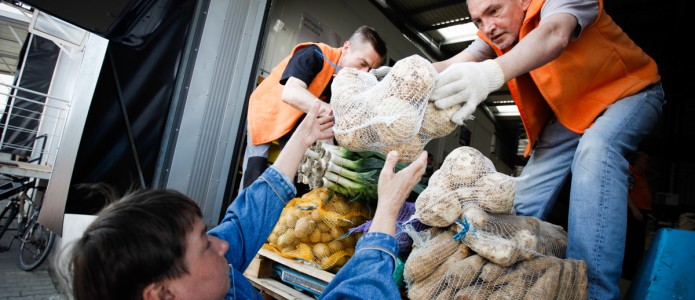
Food Banks have been operating in Poland since 1997. They collect food at venues where it might go to waste – from producers, shops, and farmers – to then hand it over to the needful. This is how approximately 140,000 tonnes of food reach more than one million recipients in need each year.
We are talking to Monika Archicińska, Co-ordinator of the Żywność – dobro, które angażuje (Food – the Goodness of Involvement) Project, about how food is acquired.
In February, you launched a campaign encouraging volunteers to join your efforts. Why is working with you worthwhile?
Nearly 9 million tonnes of food go to waste in Poland each year – in production, distribution, and households. Our purpose is to reduce these numbers while securing food for the needful; there are around 2.5 million in Poland. We stop waste while helping others: isn’t that enough?
The main question is whether people actually understand your objective. Do you have followers interested in the mission?
Yes, many. They find the rational food management message attractive. They are aware of the fundamental paradox: as a society, we waste tonnes and tonnes of food while being surrounded by an army of the malnourished. Our goal is to make the status quo common knowledge and get even more people on board.
Food Banks are…
Foundations, associations, and municipality and association unions, all non-governmental organisations. Poland has a total of thirty-two Banks operating in partnership with three thousand partner organisations, the latter responsible for the direct delivery of food to those in need.
You represent the Food Bank Federation – the head organisation. What is your role?
Head organisation? “Co-ordinator” would be my preferred term. Our voluntarily formed Federation has a management team appointed in conformity with the democratic rule. We speak for all Banks and partner organisations, striving to design high standards on their behalf. Most recently, we implemented a system facilitating the food distribution co-ordination process, making it more transparent as well. Frequently, though not always, we are the ones initiating co-operation with supermarkets, farmers, and food distributors. Individual food banks focus on food collection followed by redistribution to partner organisations who are charged with delivering all products to the “end user”. Staying in touch with local community, partner organisations are best-informed of their needs.
What about negotiations with supermarkets, for example? You approach supermarket X and what do you tell them? What arguments do you use to convince them?
We usually describe benefits, social and economic alike. Such as reduced food waste, opportunities to support the most needful, caring for the environment. Moreover, supermarket chains consider corporate social responsibility values hugely important. Our economic arguments include the reduction in product waste disposal expenses, and a VAT waiver on food donations. It may well be said that since 2013, the law is on our side, as the benefactor incurs no food donation-incurred costs. The requirement is to offer a donation to a public benefit organisation.
The law is “on your side” – what about supermarkets?
When the new legislation was passed, we were euphoric. “Finally! The barrier has fallen!” Yet we found that other factors have to be recognised as well, like supermarket logistics and employee approach to product donations. Food donations add to the employees’ already considerable workload. In order not to turn food sorting into an extra responsibility and nothing else, employees have to identify with the non-waste policy and mission. Once that happens, food donations increase. Changes to VAT legislation were a simple legal solution, a door-opener, far from a one-stop-shop holistic problem solver. While we did not experience a sudden boom, things are definitely moving forward.
Are shops willing to co-operate?
Often as not, it takes time to convince supermarkets that the system works. The Auchan chain, for example, began with a single supermarket only, and is now following the “test case” up with plans to make other markets part of the campaign. The warehouse programme we implemented in May 2015 has turned into a major asset indeed: it enables transparency. We know where the food goes, who actually receives it, how individual partner organisations operate, how many beneficiaries they have, etc. This is of paramount importance to us, as supermarket chains have their tax accounts to handle and require detailed data. Once we provide them with such information we become their credible partner. We are also very happy to report the success story of getting local shop chains on board: they were encouraged by the fact that we are experienced and know our way around the programme.
Are individual shops co-operation decision-makers?
The head office usually decides and identifies shops considered technically and organisationally ready for the challenge.
What kind of food do supermarkets offer? Products with short shelf life?
Fresh products: mainly fruit, vegetables, and bread; groats and tea are less frequent. More durable products are probably useful during discount campaigns, and shops manage them differently.
Your goal is to reduce food waste; a supermarket donates bread. Do they know in advance that bread will be wasted?
Not really. All shop chains, supermarkets, and producers follow their own food safety standards. They know which products can and cannot be offered for sale. There are three options of handling food below the required standard: disposing of it, rejecting (i.e. disposing of) it, or donating it to us. Perfectly good food is also thrown out – at the end of the day, it is frequently the supermarket management who decide whether to use us or the dustbin. I truly recommend Taste the Waste – this movie shows the full scale of food waste and food distribution mechanisms.
Have you ever received products unsuitable for further use?
We tell people openly that we are not a waste disposal firm – not all shops found this obvious. We did experience some teething problems, following in the footsteps of organisations who used to collect food themselves in the past. Joining a food bank carries a certain message: good quality food only. Sometimes it is difficult to get that message across to the manufacturer if you act alone.
Do you also follow restrictive standards yourselves?
Yes, we actually designed a set of our own. They were born in debate, consultation, and conversation with other organisations. We have been working on sets of standards since 2014, for food suppliers and distributors separately. In turned out that while food supplier requirements were relatively well-outlined, the process of drafting partner organisation guidelines was much more strenuous. All of a sudden, we were faced with the following questions: Can an organisation apply on its own to become a partner? What criteria does a partner institution have to meet as a fresh food distributor? What kind of staff would be required? Details concerning actual food recipient organisations became important alongside distribution methods and food safety precautions with future beneficiaries in mind. The ultimate purpose was to design a uniform distribution system and a set of recommendations. We wanted each step of co-operation to be crystal-clear. We wish to be transparent in all our actions.




